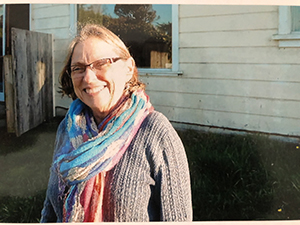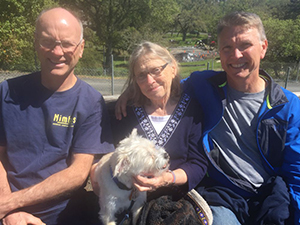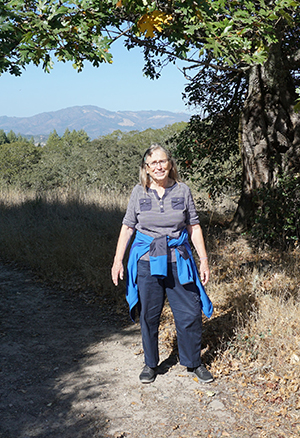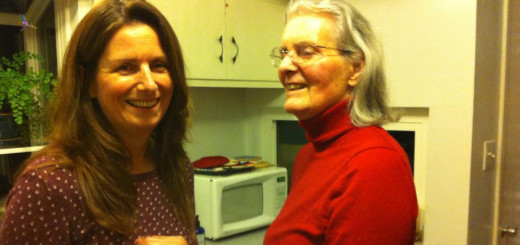North Bay man makes memories with mom
Steve could tell something was wrong with his mom, Jeanne. When her financial advisor called Steve to tell him Jeanne could no longer manage her finances on her own, Steve knew it was time for her to see a neurologist. Saving her from financial scams, getting her into a support group, taking a sing-along class and finding a nice quiet place for her to live, Steve has made the best of the time they have.
Jeanne’s early life
Jeanne grew up in Oklahoma and moved to the Bay Area as a teenager. She met her husband in high school and they married soon after graduation. The two of them moved to Southern California where they would go on to have three children.
Sadly, in 1978 at the young age of 42 Jeanne’s husband passed away, leaving her to raise their three children alone. After grieving this sudden loss, Jeanne found a job as a research librarian at a medical firm.
From there she went to college to earn a degree in Library Science. “I was going to college at the same time as Mom,” shared Steve. “She was taking fewer classes and working, so it took her a long time to get through. For a while it looked like I might graduate first.”
Eventually, Jeanne would go on to travel, buying a teardrop trailer and traveling around the country with a friend. “Mom went on band trips with us in high school,” said Steve. “She was so supportive. Even after college when I started doing triathlons, she would drive up to watch me.”
When Steve moved to Santa Rosa, Jeanne decided she liked where he was living and moved into a home across town. Steve joked, “I call her my bungee Mom.”
A call from the financial advisor
As time went on, Steve noticed that his mom was taking strange routes to get to familiar places but shrugged it off, assuming his mother knew what she was doing. He’d suggested a few times that she may need to see a doctor, but she assured him she was fine. However, when Jeanne’s financial advisor called Steve to talk about his mom’s finances, he knew something was wrong.
Steve and his siblings went to speak with the financial advisor in person where they were told that Jeanne was no longer capable of handling her own finances. They were encouraged to get added to her checking account, her trust and other legal and financial documents.
“That was the shot over the bow, and what got her to go see a neurologist,” said Steve. “I’d seen other signs before but didn’t think it was terribly serious. Watching her do the test with the neurologist really woke me up. I was floored when I saw she could not draw a clock or tell time using an analog clock.”
Jeanne was diagnosed with dementia in 2017.
Losing her license
After her diagnosis, the DMV took away her license. “Losing her license was a difficult reality for my mom,” said Steve. “Even if she didn’t drive very often, the idea of being told she couldn’t drive upset her.”
Jeanne tried to get her license back but failed the test. Despite several attempts to teach her the bus system, Jeanne opted to walk. Luckily, she lived close enough to the grocery store that she was able to do that. Jeanne’s friends also helped take her places.
Taking over the finances
Despite the financial advisor’s suggestions, Steve wanted his mother to feel like she was still in control of her finances. He continued to let her have control over them and learned too late that it was a mistake.
“I struggled with how much I should take over for her,” said Steve. “I wanted her to have as much independence as possible. That wasn’t the best way to do it.”
Jeanne fell victim to phone and internet scams. She let someone take control of her computer, losing access to it entirely. Jeanne also used the wrong checks, missed payments and made donations to any organization that asked.
“I needed to take over far earlier than I did,” said Steve. “Life goes over the edge sometimes and luckily for us, it didn’t get bad.”
Participating in groups
At some point after her diagnosis, Jeanne was introduced to the Alzheimer’s Association® where she was able to participate in the Early-Stage Support Group. This support group is designed for people who have a physician’s diagnosis of Alzheimer’s disease or a related disorder.
The person living with the disease must be aware of their diagnosis and have mild symptoms. Most groups have a concurrent meeting for care partners. The groups provide information, emotional and practical support and a way to connect with people going through similar situations. A phone conversation is required prior to joining.
Jeanne and Steve also joined a sing-along program held in Santa Rosa that met monthly. “It’s so much fun to interact with Mom in that way,” said Steve. “She loved to dance and be silly, and that let me be silly and dance too.”
Finding care for mom
Up until 2019 Jeanne was still living in her own home, alone. However, for Steve it was becoming more and more of a challenge. She would call Steve in the middle of the night, and if he didn’t answer she would call someone else.
When it got to the point that Jeanne could no longer attend the support group, Steve, on the suggestion of an Alzheimer’s Association staff member, moved his mother into a care setting. Steve found a memory care unit that was perfect for his mother, and one that he enjoyed visiting.
“I really enjoyed visiting my mom at the memory care unit. The more I went the more I recognized the people,” said Steve. “While they never remembered me, I knew them, and I could call them and talk to them by name.
“It was fun to take that time to relax and be with them and enjoy them as people, even as they were losing who they were. It was really enriching.”
The pandemic
When the pandemic began, it put a stop to Steve’s visits. “I used to be able to drop in any time,” said Steve. “We’d go for an hour walk and play basketball, giving us a way to really bond.
“The pandemic was horrible, it felt like solitary confinement. I could only talk with her on the phone.
“Sometimes our video conversations would only be for 10 minutes or less. She would just look at me and then walk away. I’d wonder if she was mad at me, or if it was that she just couldn’t focus on the screen.”
A return to in-person visits
Steve decided it was best for Jeanne to move to another smaller care setting where there was less noise, less people, and more open space for her to walk. “Moving her during the pandemic was hard,” said Steve. “It’s hard to adjust to a new place, and I couldn’t be there.”
One of the main reasons for the move was that it allowed Steve the opportunity to spend more time with his mom. Because this was a privately owned care setting Steve was able to follow the guidelines set in place by the Centers for Disease Control and Prevention (CDC). Mother and son were able to go on walks together, remaining six feet apart and wearing masks.
“It’s been wonderful to see her,” said Steve. “I visit once or twice a week.” Sadly, Jeanne has continued to decline despite her new environment and was recently put on hospice.
“Through the process I lost my mom several times,” said Steve. “We had always been very close, sharing many interests. When the relationship transferred from being equals to me caring for her and minding her everyday living, I lost the mother I knew. When she continued to weaken and we put her on hospice, I cried a day of tears.
“There have been many times in this journey where I have cried and laughed with her. We’ve made the best of the time we’ve had, and although the disease is tragic, I’ve felt fortunate to have had the time to spend with her, helping her. My siblings who live far away have been able to get far more sleep than I, but I have memories and contentment of doing right by her.”
For more information on being a caregiver please visit our website at alz.org/care. The Alzheimer’s Association offers many early-stage support and education programs that can also be found on our website.
Learn more:




















